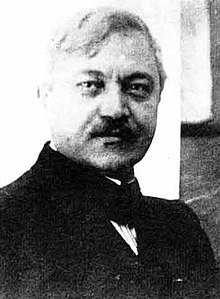Salvatore Di Giacomo
Salvatore Di Giacomo | |
|---|---|
 Salvatore Di Giacomo, Neapolitan poet | |
| Born | 12 March 1860 |
| Died | 5 April 1934 (aged 74) |
Salvatore Di Giacomo (12 March 1860 – 5 April 1934) was an Italian poet, songwriter, playwright and fascist, one of the signatories to the Manifesto of the Fascist Intellectuals.
Di Giacomo is credited as being one of those responsible for renewing Neapolitan language poetry at the beginning of the 20th century. The language of Salvatore Di Giacomo is, however, not the everyday Neapolitan language of his contemporaries; it has a distinct 18th-century flavour to it, with archaisms that recall the golden age of Neapolitan culture. This was the period between 1750 and 1800, when Neapolitan was the language of the best-loved[citation needed] form of musical entertainment in Italy, the Neapolitan comic opera.
Early career
Di Giacomo was born in Naples.
He studied medicine briefly, largely to satisfy his father's wishes, but gave it up for the life of a poet. He then founded a literary journal, Il Fantasio, in 1880, and, like many young writers, had a varied apprenticeship, working in a print shop, as a journalist and publishing some of his early verse in the Neapolitan daily, il Mattino. He even wrote a series of youthful stories à la E. T. A. Hoffmann and Edgar Allan Poe set in an imaginary German town inhabited by sinister students and mad doctors.
He had a lifelong love of libraries as well as literary and historical research, founding, in the course of his career, the Lucchese section of the National library in Naples and holding the position of assistant librarian at the library of the San Pietro a Maiella music conservatory. He was, with Benedetto Croce, one of the founders of the literary journal, Napoli Nobilissima. He was also an expert of the history of his land, and he published the work Per la storia del brigantaggio nel Napoletano in 1904. He received a critical boost in 1903 when Croce published a defence of dialect poetry. Di Giacomo published no anthology of his own collected poems until 1907, when he was 47 years old.
Plays and lyrics
Di Giacomo's plays, such as A San Francesco and Assunta Spina, are bitter stories about turn-of-the-century life in the Naples of the Risanamento (the massive, decades-long urban renewal of the city that displaced tens of thousands of persons), workers whose health is ruined by their labors, prostitution, betrayal, prison, crime, etc. As a song lyricist, he wrote easily and abundantly for the famous Neapolitan song festival of Piedigrotta, a fact that still leads some critics to dismiss him as a lightweight.
Use of language
Di Giacomo seemingly viewed standard language as necessary for modern commerce and politics, but almost by definition devoid of the life that people bring to the language they speak, the vernacular turn of phrase that exists only at a particular place in a particular time for a particular people. He closed his own essay on Neapolitan poetry, written in 1900, with this passionate quote from Dante: "With the gifts God gives us from Heaven, we shall try to renew the language of the common people."
Sources
This entry is an abridgement of a Salvatore Di Giacomo[1] article on another website and has been placed here by the author and copyright owner of that article.
References
External links
 Media related to Salvatore Di Giacomo at Wikimedia Commons
Media related to Salvatore Di Giacomo at Wikimedia Commons- Works by or about Salvatore Di Giacomo at the Internet Archive
- Works by Salvatore Di Giacomo at LibriVox (public domain audiobooks)

